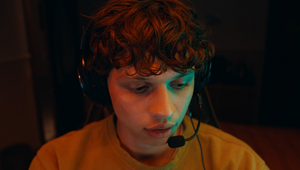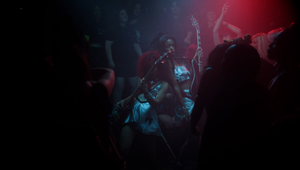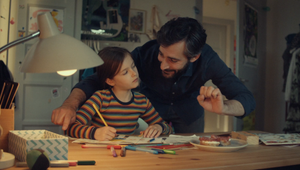
“Instinct and Rhythm” Led David Webb’s Editing on Netflix’s Upcoming Drama ‘Joy’

Born in 1978, Louise Joy Brown marked one of the world’s most ground-breaking technological advancements – she became the first ever in-vitro baby. Behind her life, and that of all the babies after Louise, stood 10 years of tireless work and collaboration between surgeons, scientists and embryologists. Today, Netflix promises to tell Louise’s story along with that of the people who paved the way to her birth, in Ben Taylor’s (‘Sex Education’) newest film, ‘Joy’.
After working on ‘Sex Education’, managing director at Final Cut David Webb is joining forces with Ben Taylor once again, to edit upcoming ‘Joy’. David started his editing career as an assistant to Final Cut founder Rick Russel, and has been with the company since. Now, David’s reputation precedes him – cutting ads and music videos though the early noughties, working with Edgar Wright, Vaughan Arnell and Traktor are just a few of his achievements.
In 2013, at the request of director Jim Field Smith, repped by RSA at the time, David cut his first long-form project – comedy drama ‘The Wrong Mans’, starring James Corden and Matthew Baynton. Since then, David has been ripping through the world of commercials and episodic TV, with projects like ‘Raise Your Arches’ for McDonald’s, TV show ‘Hijack’ and many more.
Today, David tells LBB’s Zoe Antonov about cutting ‘Joy’, compressing and expanding the storyline when needed and the mental backflips he had to do to switch from an episodic to a long-form narrative edit mindset.
LBB> How did you end up cutting on Netflix's 'Joy'? How long has this project been in the making?
David> Getting the gig to edit ‘Joy’ was bittersweet for me. I was actually the stand-in for my good friend and fellow Final Cut editor Steve Ackroyd who was diagnosed with brain cancer months before the shoot commenced. It’s a strange way to achieve a long-held ambition, fortunately a cancer diagnosis did not rid Steve of his competitiveness or sense of humour, so he wished me well whilst secretly hoping I fucked it up royally. The editorial Schadenfreude of editors working on the same roster is something to behold!
LBB> What is your relationship with director Ben Taylor like? How did it develop throughout this project?
David> Working with Ben is a dream, he's a cinephile, who's earned his stripes through decades of hard work in the industry. He's immensely passionate about film making and trusting of his collaborators, once that trust is earnt. We first met in the early ‘00s when Ben was a director’s assistant and I was editing music videos. I knew sweet FA about filmmaking at the time but was blagging it, Ben knew a little more but didn't quite have the platform to show it.
We both graduated to making TV ads and went our separate ways for a while but reconnected when I clocked his directors credit on ‘Cardinal Burns’ and sent him a text congratulating him on his work. We had a few narrow misses but eventually lined up working together on ‘Sex Education’ for Netflix. With fellow editor Steve Ackroyd and laterly Phil Hignett, we formed an incredibly tight bond, cutting three seasons of the show together, one in the depths of lockdown when only policemen, NHS workers and, erm editors were making their way into W1 to work.
LBB> This is also your first ever feature film edit. How did you feel going into the project and what did you expect?
David> After 20 odd years cutting all sorts of stuff, I felt ready to edit my first feature. Editing at its heart is instinct and rhythm, but editing is also a craft that is developed and honed over years of practice. Those years of practice didn't count for much in the film world, so both Ben and I, as feature film novices, were very much under the microscope. This gave us all the motivation we needed to rise to the challenge and bring this film to life.
LBB> What challenges arose throughout and how did you tackle them?
David> We'd both worked on episodic, so working at feature length didn't feel like much of a challenge at first. We were used to cutting one-hour episodes of telly, but we hadn't truly understood the nature of telling a complete narrative within a feature length time frame.
Episodic TV typically deals with short periods of time and introduces various narrative threads that are left open ended to ensure return viewing. We had a 10-year time frame to condense into our running time and the challenge of presenting scientific endeavour in an interesting way.
Working in short form and music videos helped us, as we were well-versed in montage and condensed narratives, we were also used to working with a comedic tone but switching to earnestness when required a 'la ‘Sex Education’. In this way, we made what could have been a dry and overly sentimental subject engaging to watch and allowed the final act to develop with the gravitas and emotion it deserved.
LBB> And what were some of the most fun parts about this job?
David> Having time to hone a piece of work and really challenge each scene and line to see if it deserved to remain was a pleasure. Working with period needle drops was fun and emblematic of the work Ben and I do together. Those wormhole days of listening to ‘60s and ‘70s music were time well spent.
LBB> What led your editorial direction when cutting ‘Joy’? Was it the genre of the film, was it the rhythm of the story, or something else? How did you approach it?
David> Performance leads a story of this nature. I never enter a project with a preconceived idea of how I might tackle the editing, I respond to the rushes and the director's vision. In this instance it was a delicate balance giving the story the gravitas it deserves without falling into mawkishness. Ben got fantastic performances from all of the leads and it was a pleasure to fine-tune those performances to land the seriousness of the issues and give the performances the screen time they deserved.
LBB> How did the editing tie in with the storytelling in the film?
David> Compression and expansion! Sounds like a chapter in a physics textbook! But this was the requirement. The opening act compresses time to get us quickly into the endeavour, the second act sees it all unravel and the final act is like a moment suspended in time to give weight to the emotional impact of the scientific achievement.
LBB> In the end, what did you love most about the result?
David> It's wonderful as a filmmaker to get a response from the audience. When there are tears and chuckles in the auditorium, it's immensely satisfying and greater pleasure still, (even if only for a moment) to bring a little joy back into the world.















